
Opinions
15:42, 20-Feb-2018
Opinion: East or West? The future is in Aussies’ hands
Guest commentary by Chu Xiaoji
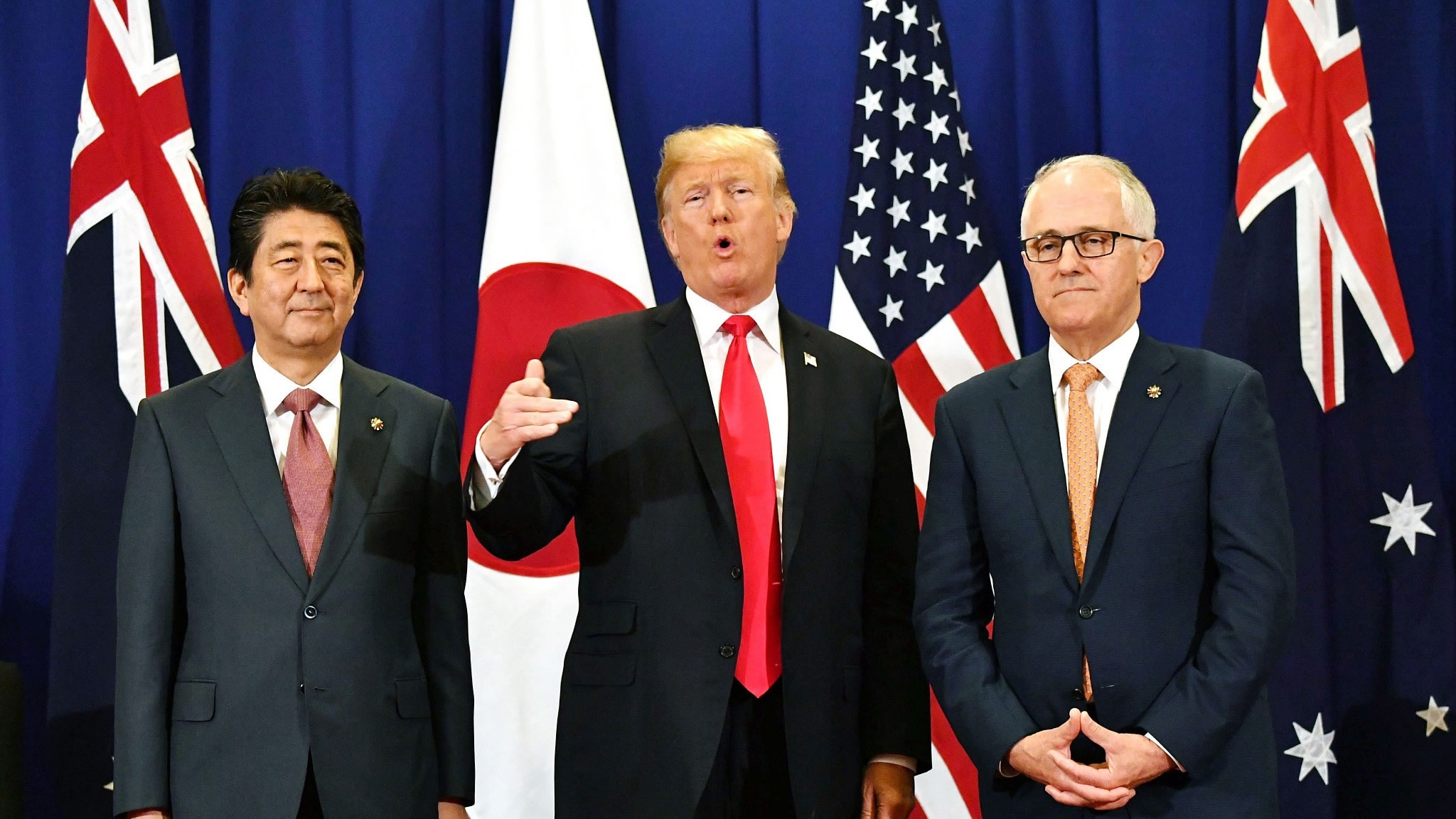
Australian Prime Minister Malcolm Turnbull will meet with US President Donald Trump on a trip to the US from Feb. 21 to Feb. 24. This year is a special year for relations between the two countries, it marks the 100th anniversary of their unique relationship.
A hundred years ago, on July 4, 1918, US troops fought side-by-side for the first time with their cousins in Australia. They worked together under the remarkable leadership of the Aussie legend – General John Monash, whose face can now be found on the 100 dollar Australian bill. Since then, the Aussies have become the most trustworthy "mate" of Uncle Sam. The tracks of their partnership can be found in every corner of the world – ranging from France during World War II to the Vietnamese jungles and to the desert of Afghanistan.
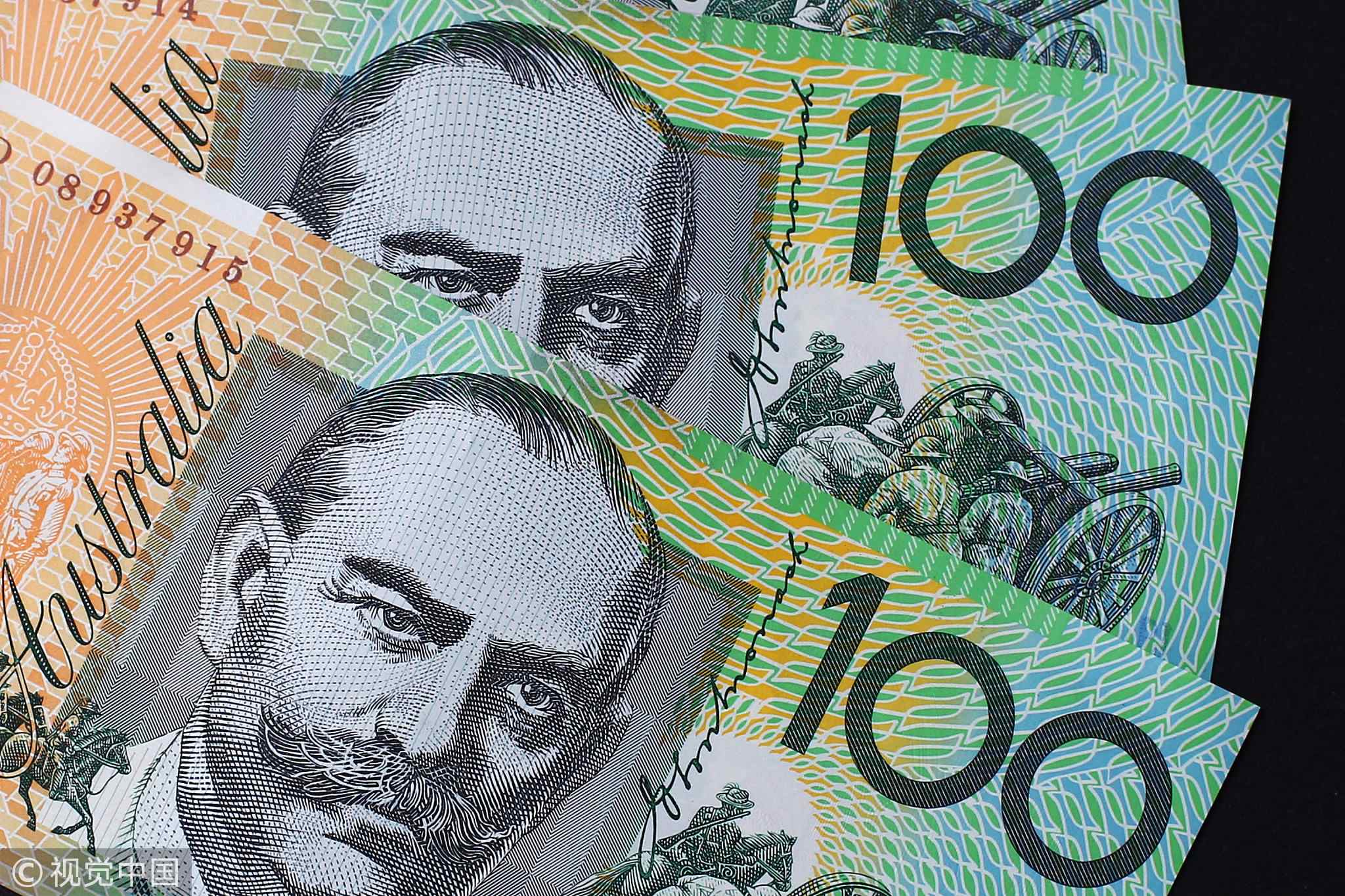
John Monash on 100 Australian dollar bill./VCG Photo
John Monash on 100 Australian dollar bill./VCG Photo
Back to Mr. Turnbull’s US visit in February. Although issues such as refugees, how to cooperate on a climate change deal, and a solution for the Middle East crisis are of crucially significance, the core issue must be strengthening their strong and historic military alliance. The last 100 years witnessed their intimate relationship in terms of their military cooperation – what type of co-operation will we see in the next century? Will they maintain this kind of relationship, and continue to work together in global affairs? Or is their relationship under threat due to potential differences on important issues like climate change or refugees.
In the short term, Australia will still stand together with their American allies in terms of military operations, because the alliance between the US and Australia has always been the cornerstone of an American Asia-Pacific strategy.
The two major reasons for this are geography and culture. Geographically, if we say that the first island chain is effectively a fence set up by America in East Asia, then Australia can be seen as the final stronghold of American interests. Australia serves as a bridge between the Pacific and Indian oceans, but is some distance from the Asian mainland. A good relationship with Australia is essential for cultivating interests in the region. During World War II, Australia was the last stronghold of the US Navy in the Asia-Pacific region when the Philippines was occupied by Japan. Australia plays the key role in American Asia-Pacific strategy because of military value as a result of its location.
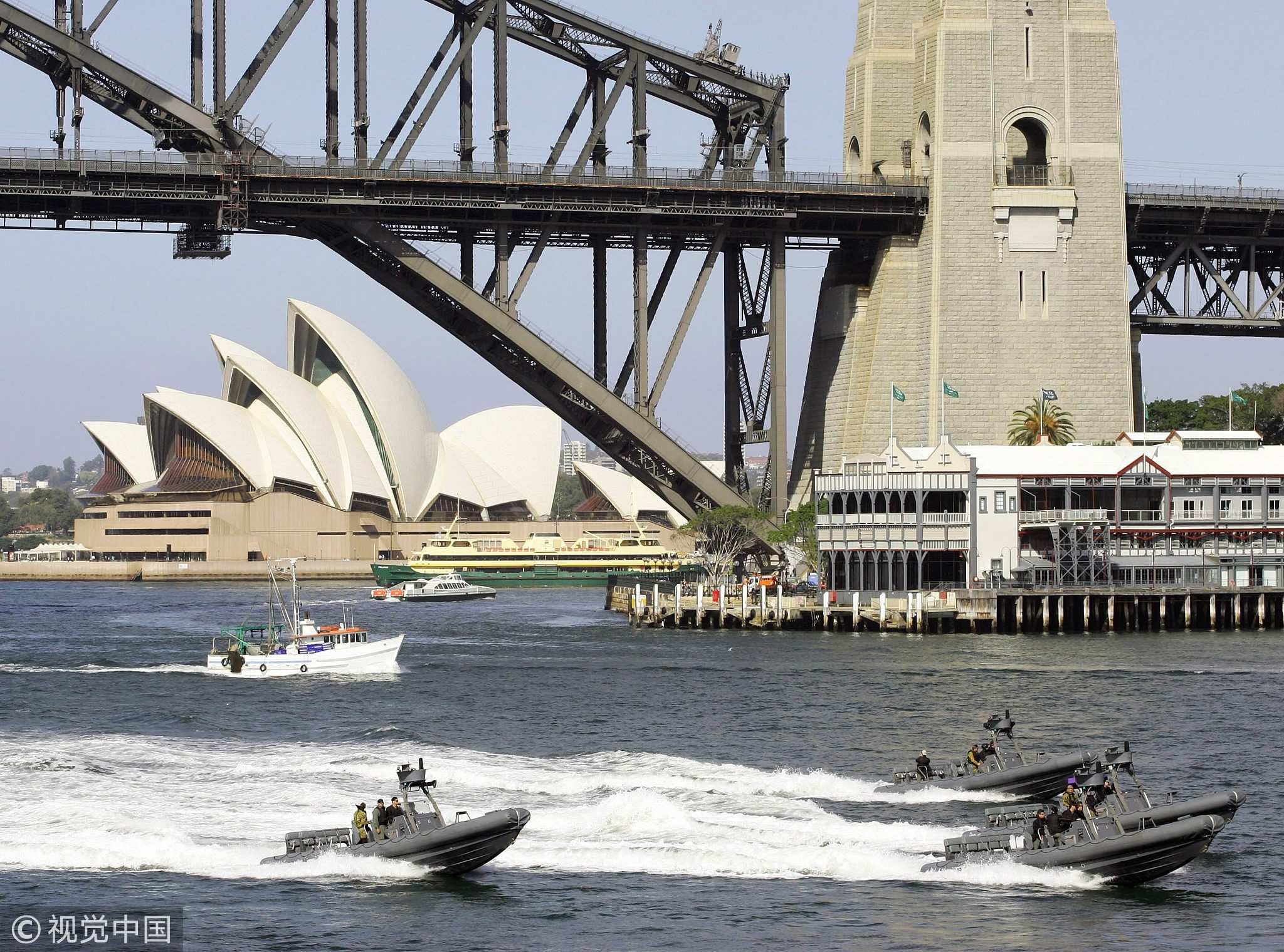
Army and Navy special forces perform training exercises on Sydney Harbour on Aug 29, 2007/VCG Photo
Army and Navy special forces perform training exercises on Sydney Harbour on Aug 29, 2007/VCG Photo
Aside from the importance of its geographical position, Australia’s cultural proximity to America makes her a valuable ally. The mainstream culture of both countries has an important common source – the United Kingdom – and so the two appear to be cousins. For the Aussies, the Americans are their lifelong "friends," as they share a lot in common. Both of the countries are built on traditional Christian values, composed of the British and Irish people, speaking English. As far as Americans are concerned, Australians are obviously going to be more trustworthy friends than Japanese and Koreans, because they have the same ancestors and culture. And as far as Australians are concerned, fighting shoulder to shoulder with Aussies is like fighting shoulder to shoulder with your cousins. Cultural and ethnic affinities mean that these two countries can maintain a higher level of cooperation.
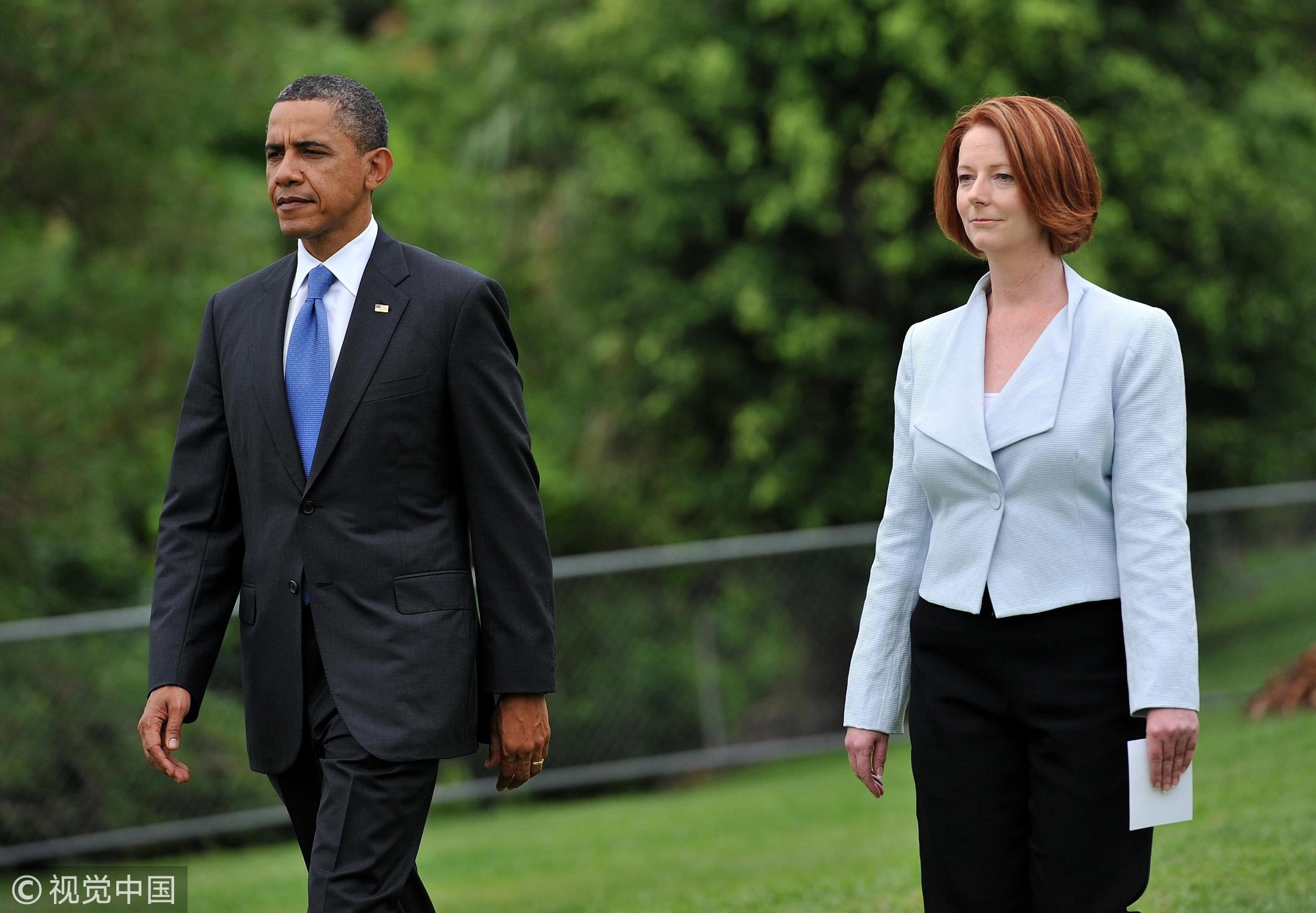
The then US President Barack Obama and the then Australian Prime Minister Julia Gillard arrive at the memorial in Darwin, Australia on Nov 17, 2011/VCG Photo
The then US President Barack Obama and the then Australian Prime Minister Julia Gillard arrive at the memorial in Darwin, Australia on Nov 17, 2011/VCG Photo
The former Prime Minister of Australia John Howard once described Australia as the Deputy Sheriff for the United States in the Asia-Pacific region. In 2011, Barack Obama announced a strategic US military rotation program in Darwin, Australia. Therefore it is safe to say that, at least in the short-term, Australia will serve as the most important partner for US interests in the Asia-Pacific region. Australia will remain its western character through actively participating in global affairs on the same side of the US.
But how about the next 100 years? The seemingly unbreakable US-Australia alliance is facing potential challenges in a rapidly changing world, and the challenges are rooted in globalization. On the one hand, the trend of globalization brings the greatest benefits to Australia in terms of economy, culture and society. As a result of globalization, the Australia has become one of the most affluent countries in the world due to the export of the continent’s resources. In addition, it is globalization that has brought diverse cultures to Australia and this multiculturalism has been the secret behind Australia's wealth. In major cities of Australian cities like Sydney and Melbourne, it isn’t uncommon that a person with Italian background is talking with another person with Asian characteristics, both with smiles on their faces.
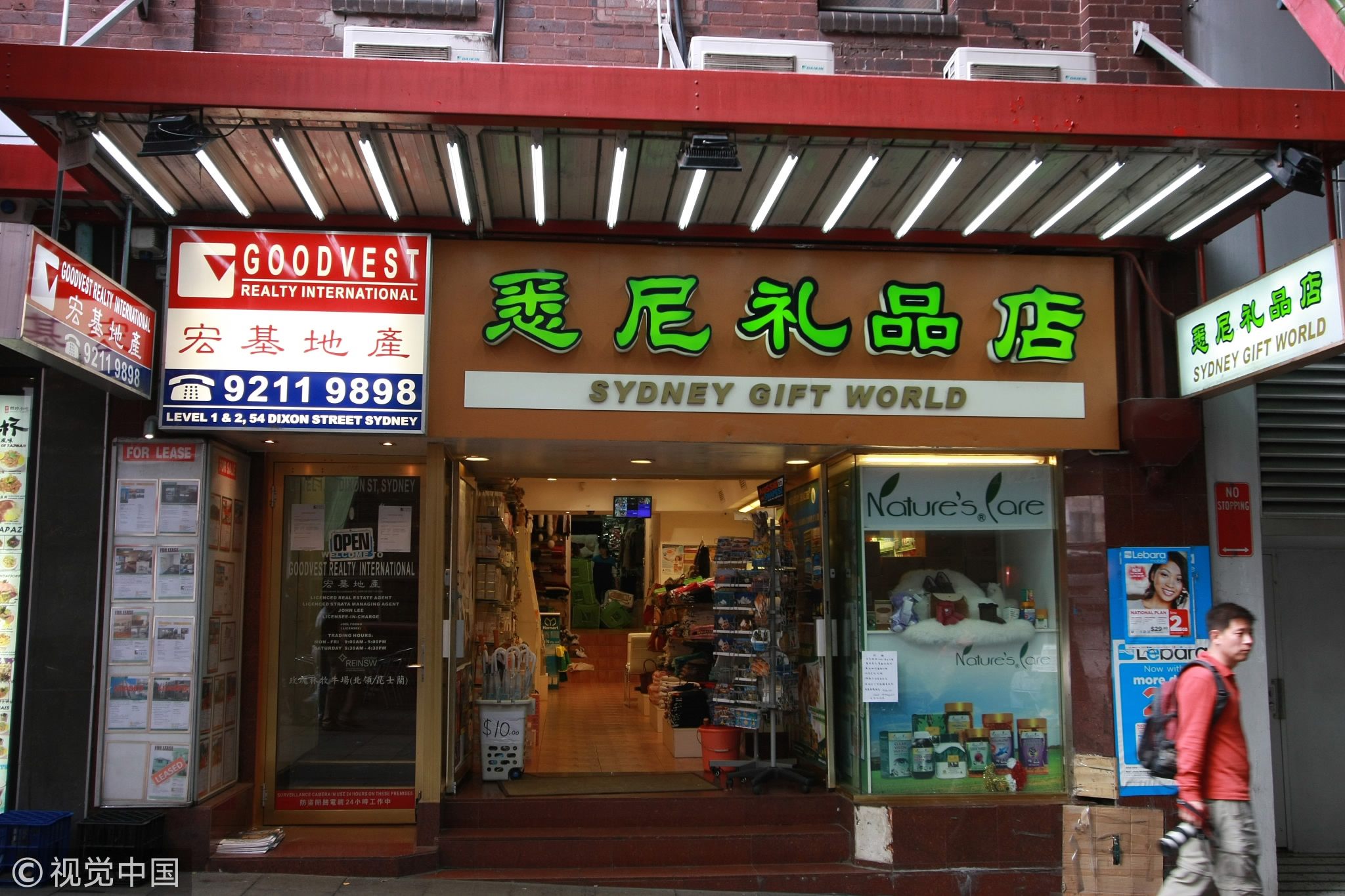
A Chinese gift shop in Sydney/VCG Photo
A Chinese gift shop in Sydney/VCG Photo
On the other hand, however, globalization is undermining the country’s Western roots and blurring its national identity. From the beginning of the colonial era until the mid-20th century, the vast majority of Australians were Anglo-Celtic. A hundred years ago, more than 80 percent of Australians were born in Britain or Ireland or had at least one British-Irish ancestor. However, with immigrants from Asian countries and African countries, the Anglo-Celtic element in the population is expected to drop to 62 percent by 2025. The decreased percentage of the Anglo-Celtic Australian will gradually change the way they view themselves and finally affect a change for the country’s diplomatic policy, particularly the alliance with the US.
How will they see themselves? Will it be as Asians, in line with their geography and recent immigration trends? Or will it be as Westerners, in keeping with their British-Irish roots? Private and public investment from Asian countries is flowing into Australia at an unprecedented rate. Some people see a transformation taking place almost imperceptibly, as more and more Asians come to Australia and contribute to cultural diversity and change. If this is true, Australia will need to de-couple itself from stereotypical Western positions on a range of issues and learn to assert its independence from US interests. For some Aussies without an Anglo-Celtic background, the spirit of Australia is far from their interests. In their eyes, the term “Australian” carries more weight than anything else – they are neither Western nor Asian just Australian. In the light of this evolved national identity, will they still be willing to serve in the army to fight for Western values? That’s the main question behind the US-Australia alliance.
The future of this relationship will be determined by the Aussies, not by their cousins across the Pacific.
(Chu Xiaoji graduated from the University of Sydney. He is majoring in Social Policy and conferred a Master of Arts Degree. He has been doing journalist practicing in Australia and China. The article reflects the author's opinion, and not necessarily the views of CGTN.)

SITEMAP
Copyright © 2018 CGTN. Beijing ICP prepared NO.16065310-3
Copyright © 2018 CGTN. Beijing ICP prepared NO.16065310-3